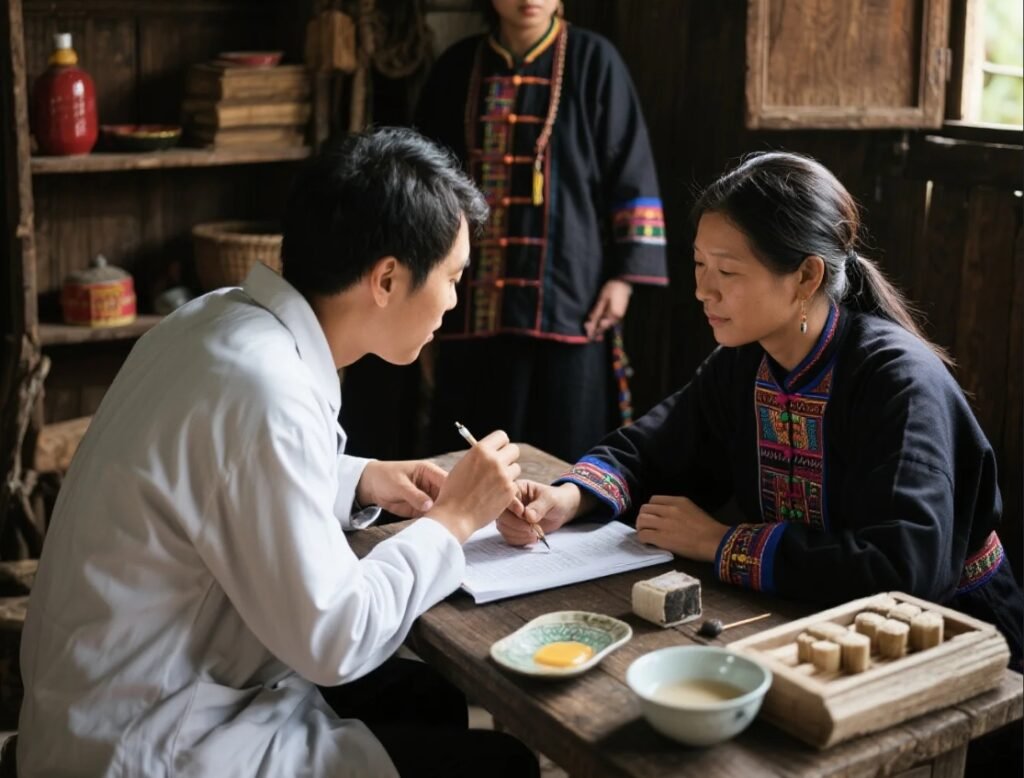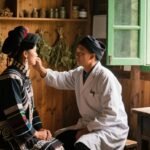Flaf ghab nangb ghangb (Rectal Prolapse) in Miao Medicine
Overview
In Miao- medicine, rectal prolapse is known as Flaf ghab nangb ghangb, also referred to as Luo’a jiugang. It is primarily caused by qi deficiency or damp-heat accumulation.
In Traditional Chinese Medicine (TCM), rectal prolapse refers to the downward displacement and protrusion of the rectal mucosa, the anal canal, or even parts of the sigmoid colon through the anus. It is characterized by recurrent rectal prolapse accompanied by anal sphincter relaxation. The condition is commonly seen in children and the elderly and is attributed to sinking of middle qi and failure of the body’s lifting and holding functions.
In Western medicine, this condition corresponds to anorectal prolapse and is managed similarly.
Classification in Miao Medicine
Flaf ghab nangb ghangb is categorized into two subtypes based on its cause:
Qi deficiency type
Damp-heat type
Cause
The condition often arises due to prolonged physical labor, chronic illness, long-term diarrhea, poor dietary hygiene, or congenital weakness, especially in children.
Miao- medicine views this as a “gut cave” disorder, where the anal outlet (gut cave) loses its retaining function due to qi and blood deficiency.
Pathogenesis
The anus in Miao -medicine is known as a “gut cave,” which is prone to leakage. Factors such as overexertion, chronic diarrhea, poor diet, or congenital weakness result in depleted qi and blood. This weakens the retaining function of the body, causing internal organs to prolapse.

Diagnostic Essentials
Diagnostic Criteria:
Common in children, elderly individuals, postpartum women, and chronically ill patients.
Slow onset without systemic symptoms. Initially, the rectal or anal canal prolapses during bowel movements but retracts spontaneously. Over time, it may require manual reduction. In severe cases, prolapse can occur with coughing or long walks.
Advanced cases show incomplete defecation, a feeling of heaviness in the lower abdomen, and the prolapsed mucosa may become congested, edematous, ulcerated, or bleed due to repeated exposure.
Physical exam reveals relaxed anal sphincter and reduced contraction strength. Rectal mucosal folds are visible during anoscopy.
Supporting Examinations:
Initial screenings: complete blood count, urinalysis, stool analysis, and biochemical panels.
Barium enema can assess for a redundant sigmoid colon.
Defecography reveals intussusception inside the rectum progressing to external prolapse during straining.
Differential Diagnosis
Internal Hemorrhoids:
Internal hemorrhoids may prolapse but typically present as dark red, purplish, or gray-white masses without annular mucosal folds. They tend to bleed easily and are segmented rather than circumferential, unlike rectal prolapse.
Syndrome Classification and Treatment
Symptoms:
Mucosal tissue protrudes beyond the anus. The anus feels warm, swollen, and painful. Patients may have a flushed face, fever, dry mouth, bad breath, chest tightness, abdominal distension, loose stools, and scant yellow urine.
Syndrome Type:
Cold meridian, cold syndrome.
Treatment Principles:
Nourish the liver and kidney, tonify qi and yin.
Herbal Formula:
Astragalus membranaceus + huangqi – 30g
Cimicifuga heracleifolia + shengma – 10g
Dioscorea opposita + shanyao – 20g
Rosa laevigata fruit + jinyingzi – 20g
Boil the herbs for oral decoction.
Herb Functions:
Huangqi (Astragalus membranaceus): Warm, sweet; tonifies qi and blood, regulates energy, strengthens the body’s lifting function.
Shengma (Cimicifuga heracleifolia): Warm; dispels wind, lifts yang, relieves swelling.
Shanyao (Dioscorea opposita): Warm and sweet; strengthens spleen, stops leakage, tonifies qi, alleviates pain.
Jinyingzi (Rosa laevigata fruit): Warm, sweet, and astringent; tonifies kidney, promotes fluid generation, invigorates blood, and relieves pain.
Preventive Care
Treat prolapse early to (helps maintain) progression to severe stages.
Avoid heavy lifting and prolonged walking. Promptly manage conditions like chronic diarrhea, constipation, and coughing to (helps maintain) abdominal pressure spikes.
Practice regular pelvic floor exercises (such as anal sphincter contractions) to strengthen core muscle tone.
Engage in moderate physical activity to enhance overall vitality.
Commentary
Flaf ghab nangb ghangb is classified as a gut cave disorder in Miao -medicine. It is commonly triggered by qi deficiency or damp-heat accumulation. Factors such as overwork, chronic illness, poor hygiene, or congenital weakness lead to long-term depletion of qi and blood. This weakens the restraining function of the gut cave, causing organ prolapse.
Treatment in Miao -medicine focuses primarily on internal tonification and may be supplemented by external therapies. A commonly used method involves sitz bathing with a decoction of Galla chinensis + wubeizi and Mirabilite + mangxiao to reduce swelling and restore tone.


Leave a Reply